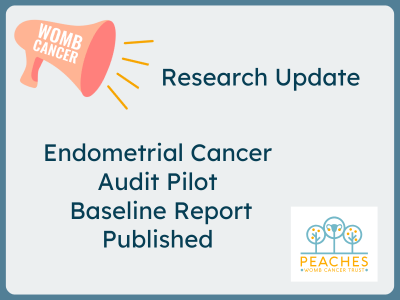The British Gynaecological Cancer Society, The Eve Appeal and Peaches Womb Cancer Trust are jointly funding the Endometrial Cancer Audit Pilot (ECAP). This project will map endometrial* cancer care, surgery and survival across the NHS in England for the first time.
The first ECAP report, the Baseline Report, has been published (April 2025). It provides an overview of endometrial cancer in England and presents findings on incidence, mortality and survival.
Increase in cases of endometrial cancer
The rate of endometrial cancer diagnoses in England has increased by 41% since 2001 and is likely related to the growing number of adults living with obesity in England.
Differences in diagnosis and treatment
The number of new cases and deaths from endometrial cancer varied across England, suggesting real differences in diagnosis and treatment pathways between regions.
There’s variation in the number of women diagnosed at an early stage (stage I and II) based on age and location. When diagnosed at an early stage, endometrial cancer is very treatable, and survival outcomes are very high.
In some areas of the country, data was missing for nearly 20% of women with an endometrial cancer diagnosis.
Further analysis of the data aims to determine the extent of the differences in diagnosis and treatment depending on location.
The pilot will run for two years and will perform meaningful analysis of routinely collected data to improve treatment and outcomes for women diagnosed with endometrial cancer in England.
It’s hoped the ECAP results in a regular audit of endometrial cancer to drive improvements in clinical practice, following the model of the successful Ovarian Cancer Audit. Whilst the pilot only includes English data, partner organisations are working towards including similar data from all four UK nations.
*The term endometrial includes womb and uterine cancer.
Find out more and download the ECAP Baseline Report here.
Acknowledgement
This work uses data that has been provided by patients and collected by the NHS as part of their care and support. The data are collated, maintained and quality assured by the National Disease Registration Service, which is part of NHS England.


